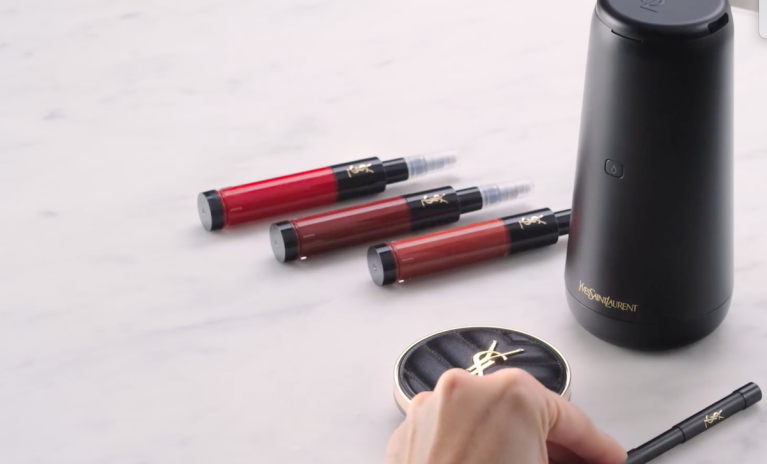“In many of our innovations, the common denominator is artificial intelligence — which we have been using for years, guided by our sense of purpose. We have growing experience of deploying AI across our brands and divisions,” said Guive Balooch, global vice president of L’Oréal’s Tech Incubator at CES. “Tech isn’t about tech. It’s about guiding people to the right choices, and it’s about understanding your individual beauty based on data that will be powered by tech.”
AI was so dominant during CES’s panels and keynotes that “tech” and “AI” were almost interchangeable. Galooch was speaking after L’Oréal CEO Nicolas Hieronimus used the event to highlight all the different ways the CPG giant is using AI, including a new product example is Rouge Sur Mesure by Yves Saint Laurent Beaute. It’s an AI-powered, connected personalized lipstick device with augmented reality capabilities to virtually try-on and recommend lipstick shades from a selection of 4,000 shade options with a touch of a button and within seconds. But that was just one example of consumer brands including Amazon, BMW, and Pfizer that used the event to launch major AI-based initiative like Walmart’s move to generative AI search to LG’s quest to create products that deploy AI smart agents (read mini-robots) to accomplish household tasks. Apple even crashed the party by announcing a Feb. 2 launch date for its Vision Pro virtual reality headset.
“We are all facing a historical turning point, and we at LG Electronics have been thinking very hard about what our role and responsibility is,” said LG Electronics CEO. William Cho “LG’s focus lies in how AI can actually make a difference in the real world, providing tangible benefits to our customers. At LG, we’d like to redefine AI as ‘Affectionate Intelligence’ because we fundamentally believe AI should bring a better custom experience that is more caring, empathetic, and authentic.”
Cho’s sentiments were echoed often at the event. CEOs were in attendance in Las Vegas from companies ranging from Intel to Walmart to Microsoft and the message was clear: AI will be deployed with a sensitivity toward consumer data and consumer preferences, but it will be the technology that defines consumer retail and packaged goods for the short-term future. And data released at the show paint a profitable picture of the financial stakes. McKinsey reports AI will create $400 billion to $660 billion in value for the retail and consumer goods industry. FTI Consulting data shows nearly 80% of online shoppers believe AI personalization can enhance their online experience. An IDC study commissioned by Microsoft found that for every $1 a retail and consumer packaged goods company invests in AI, it is seeing a return of $3.45.
“You have to view AI very differently than other technologies, in terms of the impact that it will have,” said Accenture Chief Technology and Innovation Officer Paul Daughterty during his presentation. “And when you think about your business, the way to think about AI’s impacting is to see it as a higher level of the stack than any other technology before it. It’s a very different way of thinking and a very different way of thinking about your business. I would argue that it enables a dual effect where the technology is giving people a more human way to interact with the technology, which enables more human potential and human capability.”
Advertisement: Scroll to Continue
Automotive AI
While senior executives from Mars to Mastercard detailed their AI plans, a good deal of the consumer-facing focus came from the automotive sector. Amazon and BMW showcased new Alexa LLM-powered capabilities. These new capabilities provide a more natural way of getting to know a new car and allow it to take select actions. Instead of digging through a car manual, car owners can ask BMW’s assistant for things like recommendations on different BMW drive modes and then have the assistant activate their chosen mode. They can also ask for instructions on how car features work — like the parking assistance system — and hear explanations in easy-to-understand terms through the BMW assistant’s customized voice.
Volkswagen was one of several manufacturers detailing how AI integration into future cars is going to reshape voice recognition and receive information. The company has worked with tech partners Cerence Inc to develop a “uniquely intelligent, automotive-grade ChatGPT integration.” Hyundai launched its “Software-defined Everything” (SDx) strategy, with the company’s own large language model (LLM) forming the basis of a new in-car assistant and navigation system, as well as open-source kits for third-party apps.
Intel announced plans to drive the company’s AI everywhere strategy into the automotive market, including a deal to acquire Silicon Mobility, which specializes in SoCs for intelligent electric vehicle (EV) energy management. Intel also announced a new family of AI-enhanced software-defined vehicle system-on-chips (SoCs), with Zeekr as the first original equipment manufacturer (OEM) to adopt the new SoC to deliver its generative AI-driven living room experiences to next-generation vehicles. Mercedes-Benz also introduced an AI-powered voice assistant.
“When we look at these are activities currently driving AI, at the end of the day it needs to be safe,” said Mercedes-Benz supervisory board member Sabine Scheunert. “And we need to make sure that we’ve got also good data. So, we are working in a consortium that will be active this year to make sure that we understand where we are putting AI to use, what the implications are and how do we really make sure that we’re driving the experiences everybody here in the audience hopes to see.”




